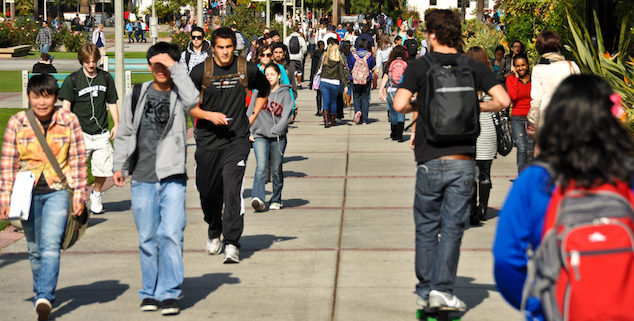News
CSU faculty, workers air concerns
 Students heading to classes at San Diego State. (Photo: Pictor Picture, via Shutterstock)
Students heading to classes at San Diego State. (Photo: Pictor Picture, via Shutterstock)The fiscal outlook at California State University is good and the sprawling, 23-campus system that serves nearly a half-million students is in the midst of expansion.
But there appear to be segments of CSU that aren’t all that happy — the faculty and the university’s workers.
The California Faculty Association addressed trustees with concerns last week as they presented bargaining proposals.
“Faculty are concerned about the state of higher education, about fair access for students of California, and about equity, racial and social justice,” CFA President Charles Toombs said Tuesday.
Rocky Sanchez, vice president of representation for the CSU Employees Union, addressed trustees as well.
“We expect your side, just as you expect our side, to bargain in good faith,” Sanchez said. “We have watched over the years as your side has twisted whatever we had to say. Our members — your staff– the people that make the campuses look great, get students through their programs, deserve that,” she added.
“We are pleased Governor Newsom values public education, but simply meeting the bare minimum is not enough.” — Kevin Wehr said,
During meetings, the CSU trustees approved of financing the purchase of land for the proposed Mission Valley stadium and campus expansion of San Diego State University. A vote to require extra high school coursework to gain CSU entrance was delayed, slated for 2022.
The trustees’ finance committee said CSU was the “most affordable” route for students, stating that 84% of current students are receiving some form of financial aid, 60% of undergraduates are receiving assistance from grants or waivers, and 54% of graduates have zero education loan debt.
Despite good news, some trustees voiced concerns as well.
“We appreciate the governor’s budget proposal for the CSU, all together, including recurring and one-time funding, Governor Newsom proposed $211 million for the CSU. While a significant augmentation to our budget, this level of funding will impose a significant challenge for meeting the priorities outlined in the trustees budget request,” said Steven Relyea, CSU executive vice chancellor and chief financial officer.
Many students are being turned away from CSUs due to overcrowded campuses, causing them to study at community colleges or out-of-state.
Kevin Wehr, a CFA vice president and head of the Bargaining Team, said he hopes the state budget will allocate more than the “bare minimum” for CSUs.
“We are pleased Governor Newsom values public education, but simply meeting the bare minimum is not enough,” Wehr said, suggesting the trustees adopt a budget cover.
CFA members also propose trustees and government officials focus on strengthening higher education across the state by encouraging improved salaries, sufficient mental health counselors on all campuses, increase inclusivity to persons with disabilities and LGBTQ individuals, increase campus safety and improve paid/unpaid leave, the CFA states.
Wehr says another issue the CFA finds is many students are being turned away from CSUs due to overcrowded campuses, causing them to study at community colleges or out-of-state.
The Public Policy Institute of California recently announced its plan to connect student data across the state in an attempt to investigate why California students “slip through the cracks” in the education system. According to the PPIC, California is one of eight states without a modern approach to tracking the educational pipeline. In 2019, the state adopted the California Cradle-to-Career Data System Act.
Meanwhile, UC administrators proposed the first tuition hike since 2017 for undergraduates who are state residents.
Wehr said the data collected will hopefully shed light on how and why California students are turned away from CSUs and how to improve graduation rates.
“An educated workforce creates an informed citizenry,” Wehr added.
Budget and bargaining meetings will continue for the next several months, during which time the CSU trustees will be searching for the next Chancellor to succeed Timothy White, who announced his retirement at the end of the 2019-2020 academic year.
The March 3 ballot includes a $15 million state bond issued to help schools, community colleges and universities with construction costs, with $2 billion allocated for each CSU and UC.
Meanwhile, UC administrators proposed the first tuition hike since 2017 for undergraduates who are state residents — a $348 hike, or 2.8 percent based on inflation, with more to come in the following years. The alternative is a plan that would freeze costs for current students at UC’s nine undergraduate campuses while increasing it over $600 for incoming freshmen.
“We understand and take seriously the concerns by students who have requested more time to consider the proposed plans and welcome ongoing productive conversations with them. The robust, comprehensive discussion about tuition at the Regents’ meeting last week will help inform a future vote by the board,” UC officials said in a statement.
Want to see more stories like this? Sign up for The Roundup, the free daily newsletter about California politics from the editors of Capitol Weekly. Stay up to date on the news you need to know.
Sign up below, then look for a confirmation email in your inbox.

Leave a Reply